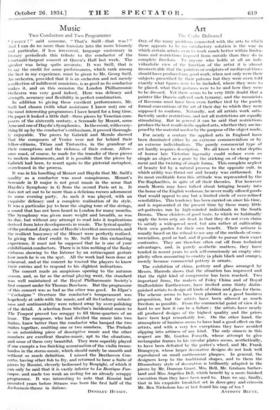Music Two Conductors and Two Programmes CRIKEY " said someone,
" That's Szell—that was ! "
And I can do no more than translate into the more leisurely and particular, if less irreverent, language customary in
literary periodicals this tribute to the conductor of the Courtauld-Sargent concert at Queen's Hall last week. The speaker was being quite accurate. It was Szell, that is to say the credit for some preformances, which rank among the best in my experience, must be given to Mr. Georg Szell. An orchestra, provided that it is an orchestra and not merely a collection of indifferent musicians, is as good as its conductor makes it, and on this occasion the London Philharmonic Orchestra was very good indeed. Here was delicacy and strength, accuracy and flexibility in perfect combination.
In addition to giving these excellent performances, Mr. Szell had chosen (with what assistance I know not) one of the most interesting programmes I have heard for a long time. On paper it looked a little dull—three pieces by Venetian com- posers of the sixteenth century, a Serenade by Mozart, some Arne and one of Haydn's Symphonies. In the event, with every- thing lit up by the conductor's enthusiasm, it proved thorough- ly enjoyable. The pieces by Gabrieli and Merulo showed that the composers of Venice were not far behind their fellow-citizens, Titian and Tintoretto, in the grandeur of their conceptions and the richness of their colour. Allow- ance must, of course, be made for the transfer of these pieces to modem instruments, and it is possible that the pieces by Gabrieli had been, to resort again to the pictorial metaphor, overeleaned in the process.
It was in his handling of Mozart and Haydn that Mr. Szell's quality as a conductor was most conspicuous. Mozart's Serenade in D major is not great music in the sense that Haydn's Symphony in G from the second Paris set is. It does not set out to be more than a delicious rococo adornment to some evening party. As such it was played, with an exquisite delicacy and a complete realization of its style. It was a particular joy to hear the singing tone of the strings, a sound that has not been heard in London for many months. The Symphony was given more weight and breadth, as was its due, but without any attempt to read into it implications derived from later developments in music. The lyrical quality of the profound Largo, one of Haydn's loveliest movements, and the resilient buoyancy of the Minuet were perfectly realized. In giving the chief credit to Mr. Szell for this enchanting experience, it must not be supposed that he is one of your exhibitionist conductors. There is in him nothing of the flashy virtuoso showing to the listener by an extravagant gesture how much he is on the spot. All the work had been done at rehearsal, and at the concert he trusted the players to know their entries and to respond to his slightest indications.
The concert made an auspicious opening to the autumn season, and, so far as the actual playing went, the standard was well maintained at the Royal Philharmonic Society's first concert under Sir Thomas Beecham. But the programme of this concert was as bad as the other was good. In Elgar's
Cockaigne " Overture the conductor's temperament was hopelessly at odds with the music, and all its Cockney robust- ness and sentimentality were refined away by over-polishing of the detail. A selection from Sibelius's incidental music to The Tempest proved too scrappy to fill three-quarters of an hour. The composer, who had divided the music into two Suites, knew better than the conductor who lumped the two Suites together, omitting one or two numbers. The Prelude is an astonishing piece of descriptive music and the other numbers are excellent theatre-music, apt to the situations, and some of them very beautiful. They were superbly played if one excepts a too finicking accentuation of the violin tremo- landos in the storm-music, which should surely be smooth and without so much definition. I missed the Beethoven Con- certo, having other fish to fry, and returned to hear a Suite of pieces by Rossini, cleverly bedizened by Respighi, of which it can only be said that it is vastly inferior to La Boutique Fan- tasqw, and made too weak an ending for an already scrappy programme. It was interesting to note that Rossini had invented years before Strauss was born the first half of the Joehanaan-theme in Salome.
DYNELEY HUSSEY.






















































 Previous page
Previous page